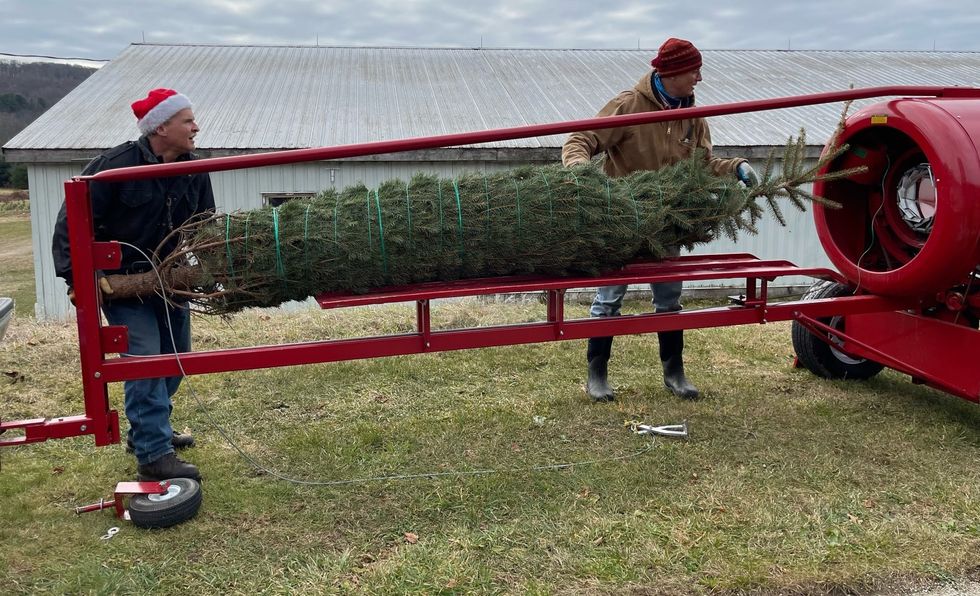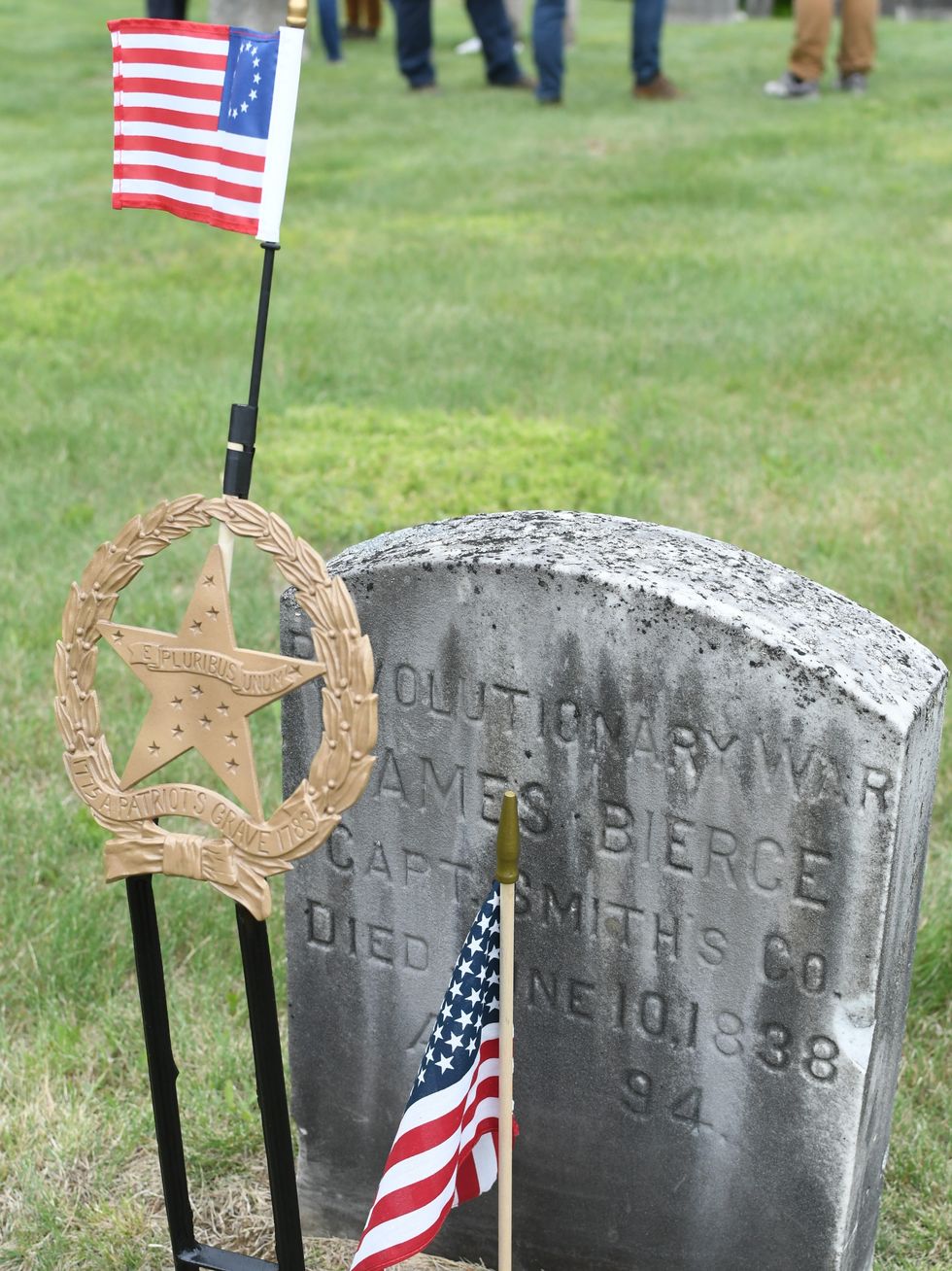
A baling machine secures a customer’s tree at Angevine Farm in Warren. Photo courtesy of Angevine Farm

Christmas tree farms in the region are feeling the pinch this year with rising operational costs and a shortage of trees to sell due to loss of crops from recent droughts, summer floods, a late-May freeze and destructive deer.
That combination of factors means that Northwest Corner families seeking that perfect Christmas tree this season may have to look harder to find it and spend a little more for it than in past years, both on farms and on tree lots.
Large trees, particularly those in the 7- to 10-foot range, which were all the rage with customers during the height of the pandemic, are particularly in short supply, said growers.
“It’s due to climate change. The reason there are not enough trees is that we have had so many losses from the various weather insults on our trees,” said Richard Cowles, an agricultural scientist with the Connecticut Agricultural Experiment Station (CAES), who also runs a small family tree farm.
The rising operational costs to farmers like himself to install irrigation and draining systems to deal with severe weather events, coupled with rising costs of fertilizer and loss of crop, has resulted in higher prices, said Cowles. “It’s a matter of supply and demand.”
The average retail price for a harvest-your-own Christmas tree in Litchfield County ranges from $70 to about $90, and about $120 in Fairfield County, according to Lisa Angevine-Bergs, executive director of the Connecticut Christmas Tree Growers’ Association (CCTGA) and owner of Angevine Farm in Warren, one of Litchfield County’s oldest family Christmas tree farms, established in 1868.
This past May’s frost, she said, devastated 300 to 400 concolor fir trees at her farm, which sprouted new buds only to have them freeze, causing young seedlings to die and older trees to become deformed.
She estimated that since 2016, more than 30,000 trees were lost to flooding and drought conditions. “We won’t know how many were actually lost until next year when the trees bud or die,” said Angevine-Bergs, noting that trees in higher elevations were hit the hardest.
Then there were this summer’s torrential rains, which “created havoc with the crop,” due to root rot, and devastation from deer, which damaged about 1,000 mature 7-to-8-foot trees that would have otherwise been available for sale at Angevine Farm.
“It was just another one of those ‘You’re kidding me,’ moments,” said Angevine-Bergs.
Cowles said he has been working with CCTGA members to help them minimize deer damage and has formulated nontoxic, all-natural lanolin into a sprayable emulsion that repels the formidable pests. “It works really unbelievably well,” said the CAES scientist.
“Deer are a problem on two counts,” he explained. They are turning to fir trees for food due to a shortage of acorns, beech nuts and chestnuts, and the bucks damage the bark of the trees when they rub the velvet off their antlers, marking their territory.
“They target the 4-foot trees, which have a nice springiness to them. They rip all the bark off at a certain height on the trees. The bucks think it’s eau de cologne, making them smell sexy.”
Cowles said despite erecting an electrical fence on his tree farm, he recently saw a buck walk through one section of the property “and in one pass, he probably destroyed about 10 trees.”
The scientist is also in the early stages of introducing genetically superior Christmas trees, known as Turkish and Trojan firs, to Connecticut, but that research, he said is still in the early stages as the test specimens have not yet produced cones.
John Gilbert, owner of Bees, Fleas & Trees in Litchfield with his wife, Carole, is in his 48th year of growing Christmas trees. He served as past president of the CCTGA at a time when there were about 450 members. Membership is half that today, he said, as farmers call it quits due to low profitability and a lot of hard work.
“The problem is, a lot of children don’t want to take them over,” noted Angevine-Berg of dwindling family farm operations.
“It’s a physically demanding job,” explained Gilbert, who retired at age 53 to grow trees, and has downsized the operation to about 5 acres over the years. “We’ll probably be selling fewer trees this year.”
While his crop of fraser/concolor fir, blue/white/Meyer spruce and white pine did not suffer from this summer’s deluge of rain as many other farms did, the May 18 frost is what caused havoc.
“It did damage to trees that had broken bud and then froze,” he said.
“They put out a second coat, but on a few you can see dead needles on the outside.”
He charges $69 per tree, including tax and bale, for customers from across Litchfield County who have been returning for generations for the old-fashioned holiday experience of choosing the perfect tree, sipping hot chocolate and taking in the scents of the season. A red mailbox at the farm accepts letters to Santa.
Because anxious customers are starting their tree shopping earlier to get the best selection and before trees sell out, several farms have instituted “reservation only” policies due to lower inventories.
Angevine-Bergs is one of them. At Angevine Farm, tree reservations — all 1,000 of them — are already sold out for 2023.
The farm will still offer holiday activities to the public on weekends, such as a food truck on Thanksgiving weekend, a Christmas barn with wreath making and other activities, tree trimmings, snacks, and visits from Santa.
“The word on the street is to get there early,” said Angevine-Bergs of the potential after-Thanksgiving tree-buying frenzy.
Had she not started taking reservations, “We’d be sold out in the first week. We couldn’t handle that safely. This is a way to safely spread it all out over a couple of weeks, plus have a calm, enjoyable experience. More and more farms are doing it as the inventory depletes.”
The co-owner of a small family tree farm in Salisbury contacted for this article declined comment due to an early and expected sell-out of trees.
Angevine-Berg’s advice for families looking to find that special Christmas tree is to not panic, and to consider a smaller tree in the 6- to 7-foot range as an alternative to a towering one, which may be more difficult to find.
Bill Dinneen, left, and Ivan Kotchoubey, age 7, place a recently restored grave marker at the headstone of David Mallery, a Revolutionary War veteran, in Cornwall Sunday, May 25.
CORNWALL — On Sunday, May 25, Cornwall held a powerful ceremony to honor local veterans of the Revolutionary War.
At the cemetery on Route 4, about 25 attendees gathered to witness the placement of 10 grave markers. Bill Dinneen of the Cornwall Historical Society and Warren Stevens led the ceremony.
“These markers had gone missing from the cemetery, we don’t know when,” Dinneen said, showing six bronze and four cast iron markers that were recently restored and painted.
He explained the markers were found in bushes at the edge of the cemetery by Gene Swanson, of Washington Depot. It was unclear why they were removed from the gravestones, and Dinneen said there could be more elsewhere in the cemetery.

“Today we have 10 markers. We have 32 names” of buried Revolutionary War veterans, Dinneen said. “The bronze markers will go to ranked soldiers,” such as sergeants, and “the cast ones will go to the oldest” of the infantry soldiers.
The restoration process included sandblasting, priming and painting. He was not certain, but Dinneen said the markers may have been originally placed by the government around World War I, at which time the original tombstones were replaced with harder stone.
Stevens explained the symbolism of the markers: A big star in the middle represents one of the colonies, 13 little stars represent all the colonies, the years 1775 and 1783 show the duration of the war, the words “A Patriot’s Grave” and “E Pluribus Unum. From many, there is one,” he said.

Attendees, some of them descendants of the veterans, assisted in the placement of the markers.
Susan Hellmann, of Cornwall, said she would be placing a restored marker at the grave of “my great, great, great grandfather Noah Harrison” who served in the Revolution. “I feel like I’m going to cry. It’s just very touching, very powerful,” she said.
Dinneen read the rank, company and lifespan of each veteran as the markers were being placed, then Stevens fired a blast from his musket. When all the markers were set, the names of the other Revolutionary veterans buried in town were read aloud.

The ceremony was held as part of Memorial Day remembrances in Cornwall. It also marked the first official event in town for the nation’s 250th birthday with more to come.
As the occasion came to an end, a light rain began.

LAKEVILLE — The Hotchkiss School girls lacrosse won the 2025 Founders League championship with an 11-10 victory over Choate Rosemary Hall May 21.
The Bearcats battled back from behind by as many as four points.
MaryHelen McCooey scored the game-winning goal with about two minutes remaining.
The win marked the fourth consecutive Founders League title for Hotchkiss girls lacrosse.
The Marvelwood lacrosse team poses for a group photo May 20 after winning the HVAL title for the second year in row.
KENT — On Tuesday, May 20, Marvelwood School lacrosse defeated Woodhall School 15-9 in the Housatonic Valley Athletic League tournament final.
It was second straight HVAL championship win for the Pterodactyls and their fifth league title since 2018.
Marvelwood and Woodhall played twice this past season with Marvelwood winning both games. They met in the championship as the first and second ranked teams in the league.
In the pre-game huddle, Marvelwood Coach Zach Maizel pumped up his players and urged them to “be aggressive early.”

Taking his message to heart, attackman Eli Jamieson scored in the first minute of game play. He scored twice more in the first period, which ended with Marvelwood ahead 6-3.
Woodhall played aggressively and stayed on the attack, but the first half ended 9-4 in favor of Marvelwood.
Jamieson was the key player on the Marvelwood squad, and he scored twice more in the final period to maintain the Pterodactyls’ lead.
Woodhall fought hard and possessed control for most of the final period, scoring five goals but falling to a final 15-9 Marvelwood victory.
HVRHS sophomore Ryan Segalla went three-for-three May 17 with Berkshire League gold in the 100m, 200m and 400m races. He was also on the gold-winning 4x400m relay team.
Berkshire League track and field wrapped up a season of competition with the league finals in Litchfield May 17. The BL festival followed with decathlon, heptathlon, steeplechase and hammer in Falls Village May 20 and Thomaston May 21.
The events included athletes from Housatonic Valley Regional High School, Gilbert School, Lakeview High School, Nonnewaug High School, Northwestern Regional High School, Shepaug Valley High School, Terryville High School and Thomaston High School.
In the gold medal tally, Nonnewaug led with 12 golds, Housatonic won 10, Northwestern won six, Thomaston won six, Lakeview won five and Shepaug won three.
For Housatonic, Senior Mia Dodge won the girls 300m hurdles.

Sophomore Ryan Segalla won the boys 100m, 200m and 400m races.
Senior Kyle McCarron won the boys 800m and 1600m races.
The boys 4x400m relay team of Anthony Labbadia, Patrick Money, Kyle McCarron and Ryan Segalla won gold.
Junior Anthony Labbadia won the boys triple jump by a margin of more than three feet. He also earned second place in the boys 400m race.
Senior Patrick Money won the decathlon.
Senior Gabi Titone won the steeplechase. Junior Olivia Brooks took bronze.
The girls 4x400m relay team of Mckenzie Lotz, Harper Howe, Mia Dodge and Maddy Johnson took silver. The same team took bronze in the 4x100m relay.
Harper Howe took silver in the girls 400m race.
Gabi Titone took silver in the girls 800m race.
The Connecticut Interscholastic Athletic Conference Class S state track and field meet will be held in New Britain on June 2.
